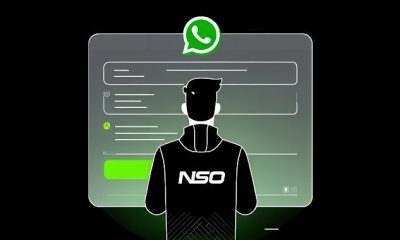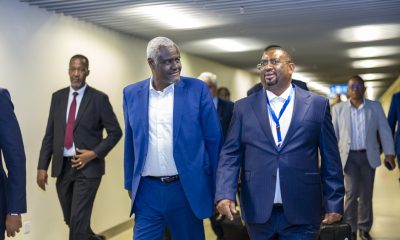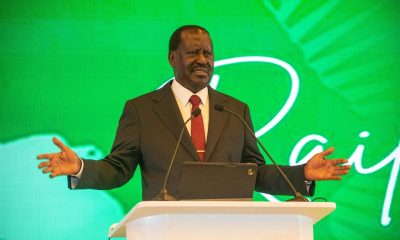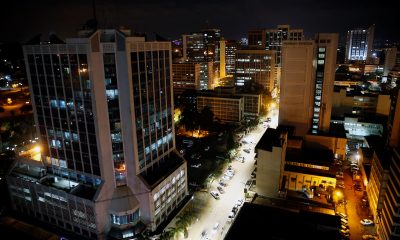Development
China To ‘Gift’ Kenya New Foreign Affairs Ministry Headquarters, Raises Spying Fears
Making the announcement on Friday, Foreign Affairs Principal Secretary (PS) Korir Sing’oei revealed that the government of China had offered to spearhead the construction project as a mark of appreciation for the 60 years that the two countries have enjoyed a close diplomatic relationship.
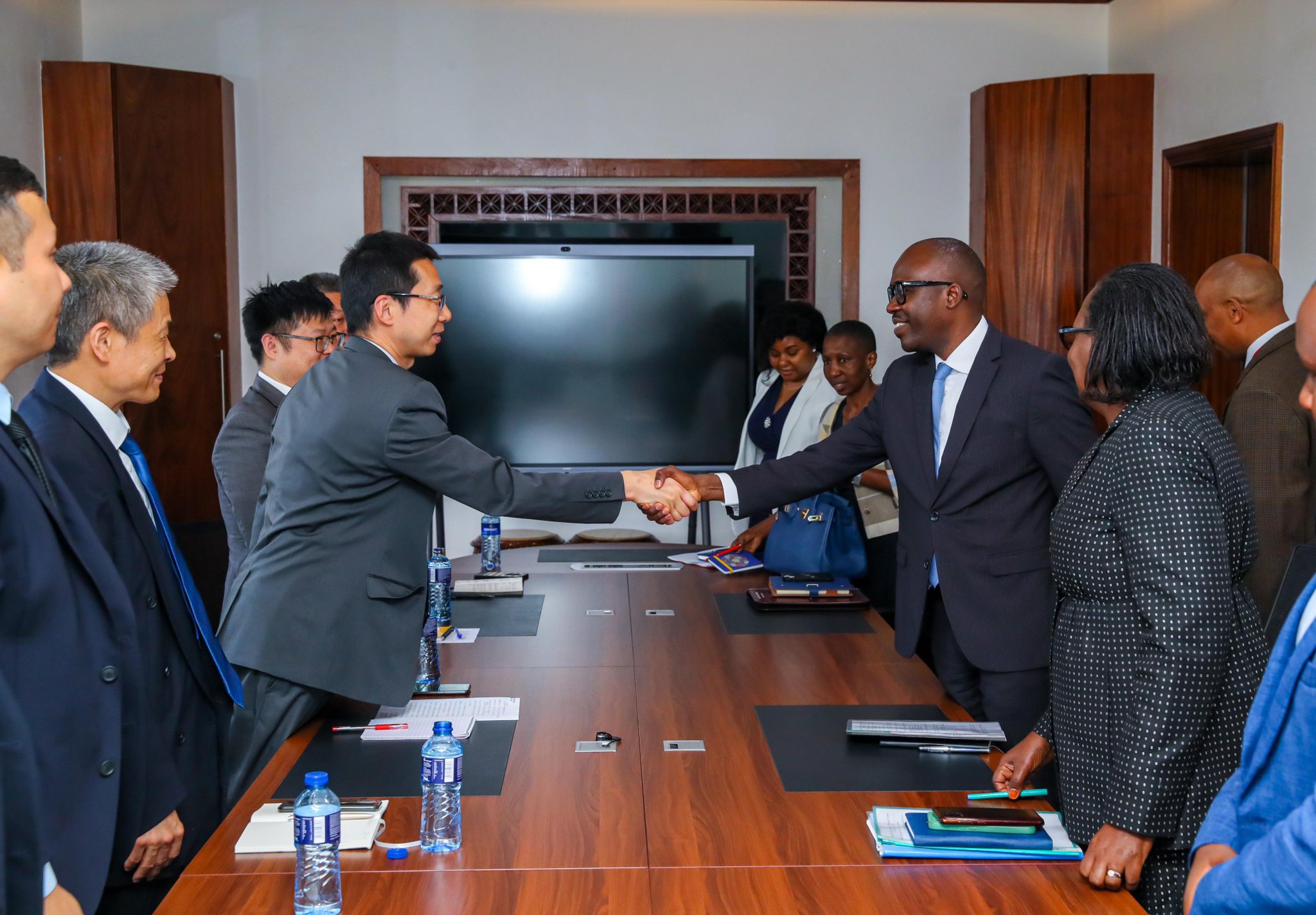
The Kenyan government has announced plans to relocate its Ministry of Foreign Affairs headquarters in Old Treasury building along Harambee Avenue to a new location.
Making the announcement on Friday, Foreign Affairs Principal Secretary (PS) Korir Sing’oei revealed that the government of China had offered to spearhead the construction project as a mark of appreciation for the 60 years that the two countries have enjoyed a close diplomatic relationship.
“Grateful to the Government of the People’s Republic of China for its commitment to support the Ministry of Foreign Affairs in the construction of the Ministry’s new headquarters as a visible marker of 60 years of diplomatic relations.” He said.
The PS added that he had met with the technical team but don’t indulge more details including cost and location of the project that is set to change the dynamics of international relations.
“Received the technical team in charge of project design in my office today.”
Spying
Many Kenyans have reacted sharply to the announcement with many expressing their fears that the Chinese government would use the building to extend their now common international espionage missions.
China has been accused in the past of giving similar offers of construction projects only to end up planting spying devices and this accusations have not only been about African countries but elsewhere around the world where the espionage regime had come under scope.
The May 2020 article by Voice of Africa (VOA) referenced a report by the Heritage Foundation, a U.S.-based conservative think tank, which stated that Chinese companies built at least 186 government buildings in Africa and 14 “sensitive intragovernmental telecommunications networks.”
“These buildings include residences for heads of state, parliamentary offices, and police or military headquarters,” the article read in part.
For these reasons, Kenyans have credible reasons to fear for their privacy, here’s some of the reactions from Kenyans to the new development of china building Kenya’s Foreign Office;
“Bugs from entrance to exit hugs in the loo, bugs in the stairs, bugs on the window, bugs in the offices, bugs all over.” Richard Odiawo said.
“That will stealthily transmit everything live to Beijing like Big Brother Africa.” Kanyi Gioko.
Yano, another Kenyan added, “Building they’ll build alright but every inch of every room will be bugged with listening devices and cameras.”
“Bugged AU Addis HQ didn’t teach us anything?” Hot Shotcreative said.
Engineer Nyasireka on X, warns of intense spying should the project succeed, “The Chinese built the African Union headquarters for free and proceeded to install a sophisticated spy equipment.
Even if the officials speak in Kalenjin only, trust some Chinese to translate it accurately.”
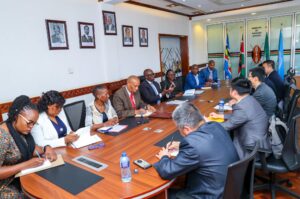
Ministry of Foreign Affairs officials when they held a meeting with the Chinese delegation in Nairobi.
Chinese hackers targeted Kenya
Last year, Reuters reported on how Chinese hackers targeted Kenya’s government in a widespread, years-long series of digital intrusions against key ministries and state institutions.
The hack aimed, at least in part, at gaining information on debt owed to Beijing by the East African nation: Kenya is a strategic link in the Belt and Road Initiative – President Xi Jinping’s plan for a global infrastructure network.
The hacks constitute a three-year campaign that targeted eight of Kenya’s ministries and government departments, including the presidential office, according to an intelligence analyst in the region.
An analyst also shared with Reuters research documents that included the timeline of attacks, the targets, and provided some technical data relating to the compromise of a server used exclusively by Kenya’s main spy agency.
A Kenyan cybersecurity expert described similar hacking activity against the foreign and finance ministries.
Between 2000 and 2020, China provided nearly $160 billion in loans to African countries, primarily for infrastructure projects.
Kenya used over $9 billion in Chinese loans to fund railways, ports, and highways. Beijing became Kenya’s largest bilateral creditor and a significant player in the East African consumer market and logistical hub.
However, by late 2019, Kenya’s financial strains were evident when a hack of a government-wide network was attributed to China.
The breach began with a “spearphishing” attack, where a Kenyan government employee unknowingly downloaded an infected document, allowing hackers to infiltrate the network and access other agencies.
The attacks appeared focused on Kenya’s debt situation. An intelligence analyst in the region claimed that Chinese hackers carried out a campaign against Kenya that began in late 2019 and continued until at least 2022.
Chinese cyber spies subjected Kenya’s president’s office, defense, information, health, land and interior ministries, counter-terrorism center, and other institutions to persistent and prolonged hacking activity.
The intelligence analyst working in the region – said Chinese hackers carried out a far-reaching campaign against Kenya that began in late 2019 and continued until at least 2022.
According to documents provided by the analyst, Chinese cyber spies subjected the office of Kenya’s president, its defence, information, health, land and interior ministries, its counter-terrorism centre and other institutions to persistent and prolonged hacking activity.
More accusations of China hacking and spying
In Africa, Chinese owned Huawei Technologies Co., the worlds largest telecommunications company, dominates African markets, has publicly been selling legal security tools that governments use for digital surveillance and censorship.
The company has been accused of helping African governments spy on their political opponents, including intercepting their encrypted communications and social media, and using cell data to track their whereabouts.
In Uganda, a threat to the 3-decades long authoritarian regime of President Yoweri Museveni, Bobi Wine, had returned from Washington with U.S. backing for his opposition movement, and Uganda’s cyber-surveillance unit had strict orders to intercept his encrypted communications, using the broad powers of a 2010 law that gives the government the ability “to secure its multidimensional interests.”
Government officials asked Huawei help to hack into Bobi wines social media. The Huawei engineers, identified by name in internal police documents reviewed by The Wall Street Journal, used the spyware to penetrate Mr. Wine’s WhatsApp chat group, named Firebase crew after his band. Authorities scuppered his plans to organize street rallies and arrested the politician and dozens of his supporters.
In May 2018, Uganda’s Mr. Museveni signed a $126 million deal with Huawei for the safe-cities project after a classified bidding process involving two Chinese companies, paying $16.3 million up front and financing most of the rest with a $104 million loan from Standard Chartered Bank, according to documents presented to a parliamentary committee.
Ugandan intelligence officers have confirmed they were taught how to use the spyware for reading emails and texts but not encrypted communications.
In Zambia, according to senior security officials there, Huawei technicians helped the government access the phones andfacebook pages of a team of opposition bloggers running a pro-opposition news site, which had repeatedly criticized the then President Edgar Lungu.
The Huawei employees located the bloggers and were in contact with the police units deployed to arrest them.
Huawei technicians helped intercept the communications of opposition bloggers running a news site named Koswe, or “The Rat,” which had repeatedly criticized Mr. Lungu, the two Zambian officials in the Cybercrime Crack Squad said.
In 2012, a data theft incident began at the African Union (AU) Headquarters in Addis Ababa, Ethiopia, where information from the AU’s computer systems was allegedly transmitted to servers in China. This continued, at the same time every night, for five years, until it was discovered in January 2017.
The bulk of the computer systems that were compromised in the African Union Headquarters were supplied by Chinese telecommunications company Huawei.
The big question has been whether Chinese companies are just doing this for the money, or whether they’re pushing a specific kind of surveillance agenda.
Former US President Trump signed an executive order that allows the U.S. to ban telecommunications gear and services from “foreign adversaries,” a term widely interpreted to refer to Huawei. The Commerce Department added Huawei to the “Entity List,” citing national security concerns, which effectively bars companies from supplying U.S.-made technology to Huawei without a license.
Despite the companies denial, It is very evident how Huawei is a complicit in Chinese and now the African government spying.
Other Chinese Projects in Kenya
The Chinese government has been overseeing construction projects in Kenya, including buildings, roads, and the Kenya Standard Gauge Railway (SGR).
However, some projects have been criticized for irregularities, such as the construction of Hazina Towers, a project funded by the National Social Security Fund (NSSF).
In April 2024, China Jiangxi International Limited Kenya’s Director was unable to account for the money paid for the downsized building.
The Senate’s Public Investment Committee raised concerns over the company’s refusal to pay NSSF the project mobilization fees.
On May 1, Busia Senator Okiya Omtatah filed a petition to uncover an alleged Ksh777 billion overpayment of funds through the SGR to Chinese constructors, claiming the excess billions were paid to China Roads and Bridge Corporation (CRBC) at taxpayers’ expense.
Kenya Insights allows guest blogging, if you want to be published on Kenya’s most authoritative and accurate blog, have an expose, news TIPS, story angles, human interest stories, drop us an email on [email protected] or via Telegram
-

 Investigations1 week ago
Investigations1 week agoBillions Stolen, Millions Laundered: How Minnesota’s COVID Fraud Exposed Cracks in Somali Remittance Networks
-

 News2 weeks ago
News2 weeks agoUS Moves to Seize Luxury Kenya Properties in Sh39 Billion Covid Fraud Scandal
-

 Investigations1 week ago
Investigations1 week agoJulius Mwale Throws Contractor Under the Bus in Court Amid Mounting Pressure From Indebted Partners
-

 News1 week ago
News1 week agoMAINGA CLINGS TO POWER: Kenya Railways Boss Defies Tenure Expiry Amid Corruption Storm and Court Battles
-

 Business2 days ago
Business2 days agoEastleigh Businessman Accused of Sh296 Million Theft, Money Laundering Scandal
-

 Americas1 week ago
Americas1 week agoUS Govt Audits Cases Of Somali US Citizens For Potential Denaturalization
-

 Business2 days ago
Business2 days agoEXPLOSIVE: BBS Mall Owner Wants Gachagua Reprimanded After Linking Him To Money Laundering, Minnesota Fraud
-

 Business2 days ago
Business2 days agoMost Safaricom Customers Feel They’re Being Conned By Their Billing System

